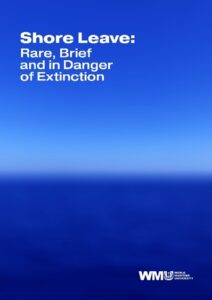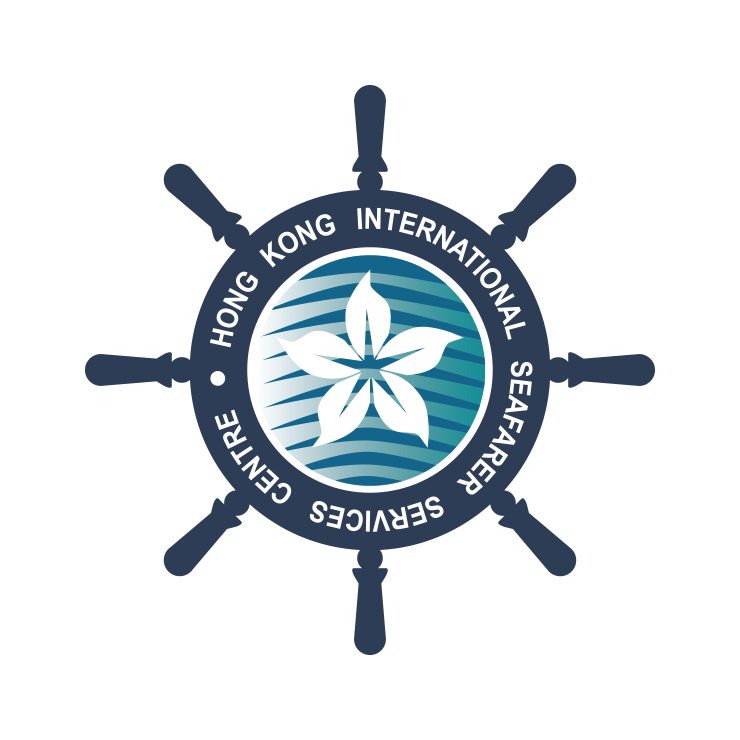上岸休假:稀有、短暂,近乎绝迹
Shore Leave: Rare, Brief and in Danger of Extinction

国际运输工人联盟海员信托基金(ITFST)和世界海事大学(WMU)发表最新报告显示,海员一直不获上岸休假机会。相关调查有5879 名海员参与,在他们平均在船上工作 6.6 个月合约期间,超过四分之一人根本从未享受过任何上岸休假,三分之一人在整个合约期间只上过岸一、两次。
A new report from the ITF Seafarers’ Trust (ITFST) and the World Maritime University (WMU) highlights the continuing absence of shore leave for the world’s seafarers. Analyzing the data from 5879 seafarers who responded to the ITFST’s Shore Leave Survey, WMU researchers concluded that more than a quarter of seafarers did not get any shore leave at all, and a third only got ashore once or twice during their entire contract, based on an average of 6.6 months onboard.
就有关海员上岸休假和岸上提供的服务,该报告描绘了一幅令人遗憾的画面。在众多受访者中,高级船员可以获得上岸休假的可能性最小,而离岸船舶和油轮上的海员可以上岸的机会亦然。在所有受访者中,即使海员确实获得上岸休假,47%海员在岸上停留的时间少于3小时,整体来说,93.5%海员在岸上停留的时间少于6小时。
The ITF Seafarers’ Trust opened the Shore Leave Survey in mid-2024 to test the concern that shore leave seemed to be progressively harder to access. Working with the team at the WMU to analyze the data, the resulting report seeks to give a true picture of the current levels of shore leave available to seafarers, how often it happened, how long it lasted, and to look at possible barriers.
ITF 海员信托基金于2024年中启动上岸休假调查,以了解海员对上岸休假似乎越来越难得的担忧。透过与世界海事大学 (WMU) 团队合作分析数据,最终的报告力求真实反映海员目前可享受的上岸休假次数、频率、持续时间,并研究海员可能面对的困难。
The report paints a sorry picture of access to shore leave and shore-based services. Officers were least likely to get shore leave, and seafarers on offshore vessels and tankers were the least likely to get ashore. Across all respondents, even when seafarers did get shore leave, 47% were able to spend less than 3 hours ashore and overall, 93.5% spent less than 6 hours ashore.
该报告还包括海员自己的回馈,从他们对开放式问题的回答中可见他们反应强烈。
The report also includes feedback from seafarers themselves, showing a strong depth of feeling evident from their responses to the open questions.
一名土耳其甲板部高级船员在一艘油轮上工作了4.5个月后说,「作为一名甲板部高级船员,大多数时候,我们的上岸休假取决于港口值班时间表和大副对船员们的态度。当我们处于6小时值班、6小时休息的状态时,几乎不可能让另一个船员替你值班几个小时,而让你上岸休息;当你自港口上船后,又很难坚持當夜班……」
A Turkish deck officer, after 4.5 months on board a tanker, reported “As a deck officer, most of the time, our shore leave is based on our port watch schedule and chief officers’ approach to officers; while having 6 on 6 off watch it is almost impossible to go out without making another officer take your watch for a couple of hours, and after you are back in port you have to take night watch which makes it hard to stand. […].”
数据显示,上岸休假障碍重重,而且存在系统性问题:船员人数减少、工作量大、检查次数增加,加上要顾及港口安全和运营效率,导致船舶停泊港口时间不足,而岸上基础设施贫乏,运输成本又高昂。这些原因以及其他诸多问题,都导致一个现状:在目前的制度下,海员透过上岸休假来恢复体力,在不少港口都是一个难以实现的梦想。
The data shows that the barriers to shore leave are multiple and systemic: minimal crewing and high workloads, increasing inspections, port security and operational efficiencies leading to lack of time in port, lack of shore-based facilities and costs of transport. All these and multiple other issues result in a situation where the current system means that for seafarers to recuperate with shore leave is an unattainable dream in many ports.
一名印度甲板部高级船员在船上待了六个月后表示:「我从2006年起就一直在航运业工作,我注意到所有港口都在慢性设法拒绝船员上岸休息。如果他们不能直接拒绝,就会收取高额费用,这样每个人都会自然而然地拒绝上岸。此外,高级船员的工作量和经济压力太大,令他们很难上岸休假。一般情况下,我们工作的油轮往返装卸石油或化学炼油厂的地方,都距离城市较远,附近又没有地方可以让我们去放松一下、吃点好吃的东西或者购物。有些港口强制我们乘接驳船上岸休假,但这些船收费非常昂贵,我们负担不起!经过长途航行,我们感到筋疲力尽,但我认为上岸休息,应该是我们的权利。」
An Indian deck officer, after 6 months on board stated: “I have been working in the shipping industry since 2006. I have noticed that all the ports have slowly found ways to deny shore leave to the ship’s crew. If they can’t tell NO! straightaway, then they will impose heavy charges so that everyone automatically refuses to go ashore. Plus, the workload and the commercial pressure on senior officers are so much that they find it difficult to go ashore. Generally, oil/chemical refineries where our tankers go for loading or discharging are far away from the cities. There is nothing close by where we can go and relax a bit, have some nice food or go shopping. There are ports which force us to use boats for shore leave, and those boats are very expensive and unaffordable! After a long sailing, we feel exhausted, and it’s our right, I think, to get a shore leave.”
ITF 海员信托会负责人Katie Higginbottom表示,「这项调查证实了我们的担忧。海员没能享受上岸休假,因为上岸休假并没有被视为对船员健康和船舶安全至关重要的事情。这是关于客观环境设定,而且环境很鲜明。我们希望此上岸休假调查结果,能够触发更多讨论,并认识到海员值得上岸休息放松一下。我们必须采取行动保留上岸休假的机会。」
Katie Higginbottom, Head of ITF Seafarers’ Trust said ‘This survey confirms our fears. Seafarers are not getting shore leave because it hasn’t been prioritised as essential for crew wellbeing and the safety of the vessel. This is about setting the scene, and it is stark. We hope that the findings will promote discussion and acknowledgement that seafarers deserve a break from the vessel. Action must be taken to preserve the possibility of shore leave.’
报告明确指出,这个问题是系统性的、多面向的。所有利益相关方面,从船旗国到港口国、从代理商到航运公司,以至海员本身,都需要合作确保维护和强调上岸休假的权利,视为海上生活的一个重要组成部分。各方都需要认识到,如果漠不关心,现行制度可能会导致上岸休假可行性逐渐消失,从而加剧本来已沉重的海员压力。
The report is clear that the problem is systemic and multifaceted. All stakeholders, from flag States to port States, agents to shipping companies and seafarers themselves, need to collaborate to ensure that this vital component of life at sea is maintained and expanded. All parties need to recognise that, unchecked, the current regime risks the extinction of shore leave as a viable concept reinforcing the strains on an already pressurised workforce.
完整报告在此The full report is available here :
https://www.seafarerstrust.org/publications/shore-leave-rare-brief-and-danger-extinction

